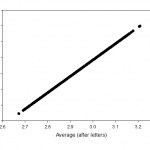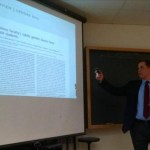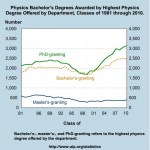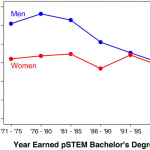Academia
I mentioned last week that I'm giving a talk at Vanderbilt tomorrow, but as they went to the trouble of writing a press release, the least I can do is share it:
It’s clear that this year’s Forman lecturer at Vanderbilt University, Chad Orzel, will talk about physics to almost anyone.
After all, two of his popular science books are How to Teach Physics to Your Dog and How to Teach Relativity to Your Dog. Orzel, an associate professor of physics at Union College in New York and author of the ScienceBlog “Uncertain Principles,” is scheduled to speak on campus at 3 p.m. Thursday, March 26.
As…
Yesterday's quick rant had the slightly clickbait-y title "GPAs are Idiotic," because, well, I'm trying to get people to read the blog, y'know. It's a little hyperbolic, though, and wasn't founded in anything but a vague intuition that the crude digitization step involved in going from numerical course averages to letter grades then back to multi-digit GPA on a four-point scale is a silly addition to the grading process.
But, you know, that's not really scientific, and I have access to sophisticated computing technology, so we can simulate the problematic process, and see just how much…
I was thinking about something only tangentially related to grading, when it struck me that the way we go about generating student grade point averages is the kind of mind-bogglingly stupid system that requires lots of smart people working together to produce. Two very different groups of smart people, with very different ways of looking at the world.
As a scientist, the starting point for assigning grades is generally a set of scores on a bunch of individual assessments. These are generally combined to form some sort of weighted average, which can be expressed as something like a percentage…
It's always a pleasure to see former students doing well, and to that end, we invited one of my former thesis students, Mike Mastroianni, class of 2007, to give a colloquium talk last week in the department. Mike went to physics grad school for a couple of years after graduation, but decided he was more interested in education issues, and is now in the process of writing his dissertation (to be defended in a few weeks) in a Curriculum and Instruction program at the University at Albany.
He gave a really interesting talk on his thesis work, looking at the evolution of gender ratios in STEM…
I'm always interested in the present and future of libraries and higher education. There's a steady stream of reports from various organizations that are broadly relevant to the (mostly academic) library biz but they can be tough to keep track of. I thought I'd aggregate some of those here.
Of course I've very likely missed a few, so suggestions are welcome in the comments.
I've done a few similar posts recently here, here and here.
What Is the Internet of Things?
Innovation Study: Challenges and Opportunities for Australia's Galleries, Libraries, Archives and Museums
Project Information…
There was some Twitter chatter the other night about a new arxiv paper called The Gender Breakdown of the Applicant Pool for Tenure-Track Faculty Positions at a Sample of North American Research Astronomy Programs:
The demographics of the field of Astronomy, and the gender balance in particular, is an important active area of investigation. A piece of information missing from the discussion is the gender breakdown of the applicant pool for faculty positions. For a sample of 35 tenure-track faculty positions at 25 research universities advertised over the last few years in astronomy and…
As previously mentioned, SteelyKid has started to get into pop music. In addition to the songs in that post, she's very fond of Katy Perry's "Roar," like every other pre-teen girl in the country, and also this Taylor Swift song:
I've seen a bunch of people rave about this, but honestly, I found it pretty forgettable until I read Jim Henley's Twitter exegesis in which he shows that the song is really about the tryst with an alien that left Swift with a faceless hybrid infant. That is, a blank space-baby. Now I can't get the idiot song out of my head.
Anyway, a week or two ago, I actually went…
Finally, the Canadian government's Tri-Agency funding councils (SSHRC, NSERC, CIHR) have released the consolidated final version of it's open access policy. The draft version came out some time ago. The consultation process garnered quite a few responses, which the Tri-Agencies were kind enough to summarize for us.
And finally it is here. I have to admit I was getting a bit concerned. The final version was rumoured to have been kicking around the various departments waiting for final sign-off for months. With the rumours of the Conservatives possibly dropping the writ and calling a spring…
Back on Thursday when I was waiting to be annoyed by a speech, one of the ways I passed time was reading stuff on my phone, which included This Grantland piece about Charles Barkley and "advanced stats". In it, Bryan Curtis makes the argument that while Barkley's recent comments disparaging statistical tools seem at first like just the same old innumeracy, it's really a question of ownership.
But Barkley was firing a shot in a second war. Let’s call it Moneyball II. This clash doesn’t pit a blogger versus a newspaperman in a debate over the value of PER. It pits media versus athletes in a…
Yesterday was Founders Day at Union, celebrating the 220th anniversary of the granting of a charter for the college. The name of the event always carries a sort of British-boarding-school air for me, and never fails to earworm me with a very particular rugby song, but really it's just one of those formal-procession-and-big-speaker events that provide local color for academia.
This year's event started, as always, with a classical music performance-- a song by Aaron Copeland, this time, so we've at least caught up to the 20th Century. (I'm not sure I want to live long enough to see a Bob Dylan…
Paige Brown Jarreau, who blogs at From the Lab Bench is in the throes of writing her dissertation about science blogging, and plowing through a lot of interview data. She's sharing some of the process on the blog, and a lot more on Twitter, where it's prompted a good deal of discussion.
One of the big things she's brought up recently is the question of why scientists seem to blog about their own research only on rare occasions (Storify link). My own answer is in there somewhere: blogging about something you're actively working on doesn't feel like a departure from doing work. If you're going…
A sort of follow-up to last week's post about the STEM "pipeline". In discussions on Twitter sparked by the study I talked about last week, I've seen a bunch of re-shares of different versions of this graph of the percentage of women earning undergrad degrees in physics:
Fraction of BA/BS degrees in physics awarded to women over time. From AIP Statistical Research.
You can clearly see that after a fairly steady rise through the 80's and 90's, this trend has flattened out over the last decade. If you crop the horizontal axis to start in the early 2000's, you can actually see a decline from…
I didn't see this before yesterday's post about Twitter, but over at SciLogs, Kirk Englehardt gets evangelical, offering a very chipper list of "Ten Reasons for Academic Researchers to Use Social Media." I'll just put the item headers here, though each of these has a more complete description, with links to lots of other stuff:
10. You’re in the Driver’s Seat
9. It’s About the Network
8. It’s Newsy and Trendy
7. Promotion (may) = Citations and Downloads
6. Spreading Your Love of Science
5. Setting the Record Straight
4. Sharing Interesting Things
3. Enhancing Your Research
2. It’s Easy
1. It…
The AAAS annual meeting was last week, which apparently included some sessions on social media use. This, of course, led to the usual flurry of twittering about the awesomeness of Twitter, and how people who don't use Twitter are missing out. I was busy with other stuff, so I mostly let it pass, and of course I can't find representative examples now because Twitter.
The truth is, though, Twitter is kind of useless. Or, rather, it's only useful for certain kinds of things-- it's social media, and much more social than media.
So it's a great medium for talking to people you're not physically…
Over at Quantum Progress there was a recent series of guest posts about a social-justice-in-physics curriculum used by high school teacher Moses Rifkin. I sort of glanced at it, said "Huh, that's sort of interesting," and moved on, but this got picked up by some right-wing sites, and exploded. To the point where the awful people on Fox's awful morning show did a segment hating on it.
The angle of attack is, of course, that this is wasting time that ought to be spent on teaching physics. And, you know, I applaud Fox News's sudden concern for the teaching of physics-- if they'd like to have me…
Via Curt Rice (or, more precisely, somebody on Twitter who posted a link to that, but I didn't note who) there's a new study in Frontiers in Psychology of the STEM "pipeline", looking at the history of gender disparities in STEM degrees. You can spin this one of two ways, the optimistic one being "Women now continue on from bachelors degrees to Ph.D.'s at the same rate as men!" and the pessimistic one being, well, Rice's post.
The accurate description, as is often the case in social science, "This stuff is really messy and confusing." Rather than being a set of nice straight pipes going from…
(When I launched the Advent Calendar of Science Stories series back in December, I had a few things in mind, but wasn’t sure I’d get through 24 days. In the end, I had more than enough material, and in fact didn’t end up using a few of my original ideas. So I’ll do a few additional posts, on an occasional basis, to use up a bit more of the leftover bits from Eureka: Discovering Your Inner Scientist…)
While Eureka is built around stories, it's really a book about the process of science, using those stories to highlight particular aspects of the scientific process. The hope is that making the…
I've done yet another piece for The Conversation, this one expanding on something I've been saying in interviews promoting Eureka: that knowing the process of science can help people sort good science from bad. In this particular case, I take the somewhat #slatepitch-y angle that the recent high-profile unraveling of the BICEP2 experiment's claim to detect primordial gravitational waves is a good thing:
Along with general disappointment, the new announcement has prompted discussion of what, if anything, the BICEP2 team did wrong. Many commentators fault them for over-hyping their results to…
This was a good week for "Chad bristles at side issues of massively reshared stories," with the Vox and gender bias stories, and also this PBS piece urging parents to tell their kids science stories. That probably seems surprising, given what I do around here, but while I fully endorse the end of that piece, the opening section in which Wendy Thomas Russell explains why she never liked science mostly makes me think that she's an awful person. She attributes her lack of interest in science to bad teaching, and provides a series of examples ending with:
Later, at the University of Nebraska, I…
I've seen a lot of reshares of this report about the long-term effect of gender bias in elementary math, which comes from an NBER working paper about a study of Israeli schools. The usual presentation highlights one specific result, namely that on a math test graded by teachers who knew the names of the students, boys outscored girls, but a blinded test saw girls outscore boys.
This sounds pretty damning, but also kind of puzzling-- is there really that much room for partial credit in elementary school math? Looking at the actual paper (which you can get emailed to you if you have a .edu…




